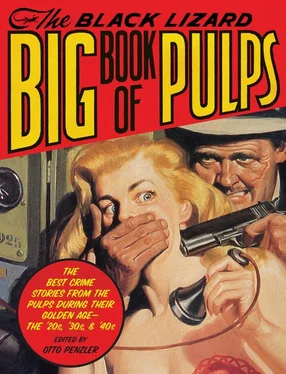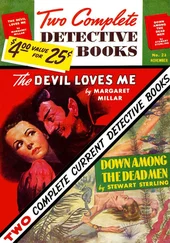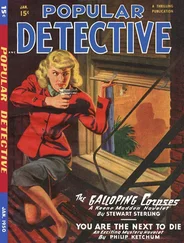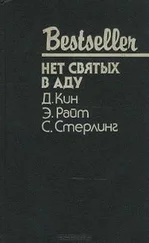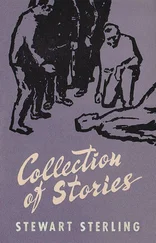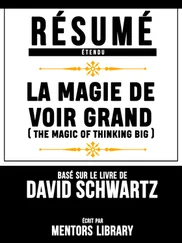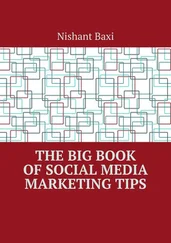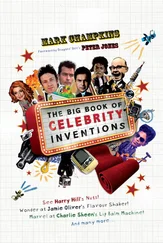They parked in front of the hotel and the man went in a minute, probably to buy a cigar and get a peek at the register. Then he came out and talked to Mrs. Healey a little while and went back in the little alleyway that led to the side door. He was only there a minute; he probably found out that it was practical to go into the hotel that way and came back and told her.
Along about that time in Raines’ yarn I woke up to the fact that he was referring to the man who was with Mrs. Healey as “this guy.” I opened my eyes and looked at him and he was looking at Gard.
Gard had stayed in the car while Mrs. Healey went back through the alleyway and into the hotel. After a couple minutes he got nervous and got out and walked up the street a little ways, and Raines went across the street and went upstairs to find out what it was all about. That must have been about the time I was checking out.
Gard must have been coming back down the other side of the street and he saw me come out and finagle with his car and get into mine, and he stayed away until hell started popping upstairs and I went into the hotel.
Raines stopped a minute. I got up and went over and rolled Gard over on his back. He groaned and opened his eyes and blinked up at me and then he sat up slowly and leaned against the wall.
Raines said Mrs. Healey must have tried Healey’s door and then waited till Healey came up the front stairway after he left me, and she ducked around a corner and watched Healey go into Mackay’s room. By that time Raines was at the top of the back stairway and he watched Mrs. Healey take a gun out of her bag and go down and listen at Miss Mackay’s door. When Healey opened the door after whittling Mackay, she backed him into the room and closed the door. Raines said she probably told him a few pertinent truths about himself and relieved him of what was left of the hundred and fifty and then opened him up with the .38.
It was a swell spot for her, with the Mackay gal there with a knife in her heart. Raines said he figured she’d intended to rub Healey from the start, before he could divorce her — Healey had said she’d sworn to kill him, before he left Chicago. A nice quiet girl — Mrs. Healey. A lady.
She’d dodged Raines on the stairs and he’d chased her down to the car, but by that time Gard was back in the car with the engine running and they’d shoved off fast. Then Raines had come back up with the sheriff and his gang to look things over. That’s where I’d seen him.
He’d taken the midnight train for LA and it had taken him all day Tuesday to locate Mrs. Healey. He’d been putting the screws on her and Gard for a split of the important money and Gard had gone into a wrestling number with him just before I arrived.
By the time Raines had got all that out of his system Gard was sitting up straight with his mouth open and his hands moving around fast and that dumb, thoughtful look on his face as if he wanted to say something. When Raines stopped to breathe. Gard said that the lady had talked him into driving her up to Caliente because she said she was too nervous to wait for Healey in LA — she said she had to see Healey and try to make their scrap up right away, or she’d have a nervous breakdown or something, and Gard — the big chump — fell for it.
He said he was the most surprised man in the world when the shooting started, and that when she came galloping down and they scrammed for LA she’d told him that she’d walked in on Mackay ventilating Healey, just like the sheriff said, and that Mackay had shot at her as she ran away. Gard had fallen for that, too. She had the poor sap hypnotized.
Gard knew I’d been up at Caliente, of course — he’d seen me; so when I walked into his place in the morning he’d figured I had some kind of slant on what it was all about and he’d taken me over to her place so they could put on their “comfort her in her bereavement” turn for my benefit.
Then, Tuesday night, when I’d walked in on the shakedown and knocked Raines out, Gard, who had had a load of what Raines had to say to Mrs. Healey and who half believed it, calculated that his best play was to take the air with her. He was too much mixed up in it to beat an accessory rap anyway, so he’d sapped me with a bookend and they’d tied Raines, who was coming to, and he’d helped her pack her things. They were going to light out for New Zealand or some quiet place like that; only she’d sneaked up behind him and smacked him down at the last minute. A lovely lady.
We all stopped talking about that time — Raines and Gard and me — and looked at one another.
Gard laughed. He squinted at me and said: “You looked silly when I clipped you with the bookend!”
Raines said: “You didn’t look particularly intelligent when our girlfriend let you have it.”
Gard snickered on the wrong side of his face and got up and went out into the kitchen for a drink of water. He found a bottle out there — almost a full fifth of White Horse. He brought it in, I untied Raines and we all had a snort.
I was thinking about what suckers we’d been, I’d popped Raines and Gard had popped me and Mrs. Healey had popped Gard — all of us. One, two, three. Tinker to Evers to Chance — only more so.
I think we were all pretty washed up with La Belle Healey. It was a cinch Gard wouldn’t want any more of her. I don’t know about Raines. But I know I didn’t.
We finished the bottle and Raines snooped around and found a full one and we did a little business with that.
I didn’t find out I had a concussion till next morning. I was a week and two days in the hospital at twenty dollars a day, and the doctor nicked me two-fifty. He’ll get the rest of it when he catches me.
The whole Healey play, what with one thing and another, cost somewhere in the neighborhood of a grand. I got a lame skull and about two-bits’ worth of fun out of it.
I pass.
The Creeping Siamese
Dashiell Hammett
The argument could be made that the most influential writer of the twentieth century was Dashiell Hammett. As writers turned from the orotund style of Henry James and his Victorian predecessors to lean and swift prose, later scholars have pointed to the undeniably profound force of Ernest Hemingway. But who influenced Hemingway? Hammett did.
Publishing dates are hard facts, not esoteric theories. Hammett’s first Continental Op story appeared in Black Mask on October 1, 1923. The quintessential hard-boiled private eye appeared frequently in the ensuing years. Hemingway’s first book, In Our Time , was published in Paris in a limited edition in 1924, and published in a tiny edition of 1,335 copies in the United States in October 1925, by which time Hammett was already well established and a highly popular regular contributor to the most important pulp magazine of its time.
In addition to the nameless operative of the Continental Detective Agency, Hammett (1894–1961) created Sam Spade, the hero of the most famous American detective novel ever written or filmed, The Maltese Falcon , which had been serialized in Black Mask , as were all of his novels excepting the last, The Thin Man.
Written at the height of his success and powers, “The Creeping Siamese” was published in Black Mask in March 1926, the year before he began to serialize his first novel, Red Harvest.

Standing beside the cashier’s desk in the front office of the Continental Detective Agency’s San Francisco branch, I was watching Porter check up my expense account when the man came in. He was a tall man, raw-boned, hard-faced. Grey clothes bagged loosely from his wide shoulders. In the late afternoon sunlight that came through partially drawn blinds, his skin showed the color of new tan shoes.
Читать дальше
